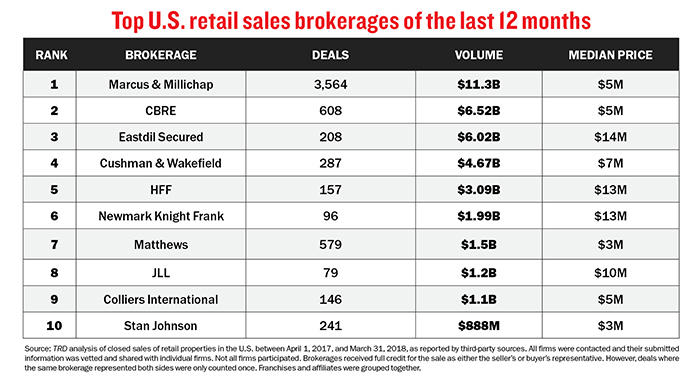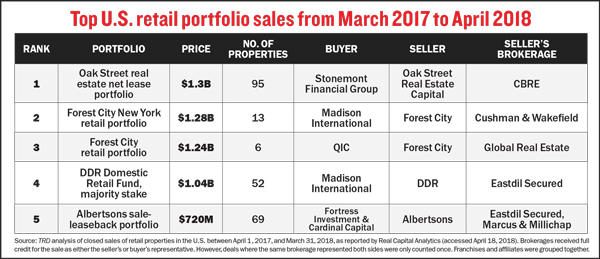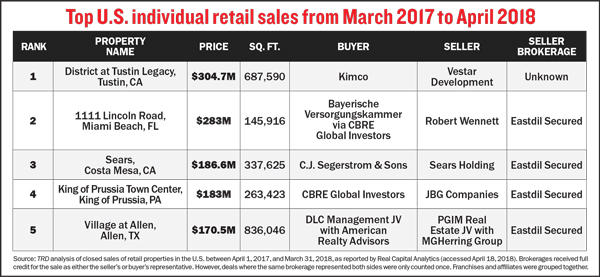Sales of retail properties may be down compared to last year, but executives at the country’s top brokerages remained characteristically upbeat, confident that opportunities are out there for the right types of properties — and for brokers with the right kinds of talent.
“Knowledge about tenants, centers, trade area and industry makes a difference,” said Mark Bratt, CBRE senior managing director and head of its retail investment sales business.
CBRE took the second spot this year in The Real Deal’s ranking of the top commercial sales brokerages across the country, with 608 transactions worth just over $6.5 billion. It came up behind Marcus & Millichap, which logged $11.3 billion in sales for 3,564 properties. In third place was Eastdil Secured, with $6 billion in deals for 208 properties. Fourth-ranked Cushman & Wakefield brokered almost $4.7 billion in deals across 287 properties.
To rank the firms, TRD analyzed retail sales transactions between April 1, 2017, and March 31, 2018, as reported by third-party sources. Brokerages received full credit for the sale as either the seller’s or buyer’s representative. However, deals where the same brokerage represented both sides were only counted once. Franchises and affiliates were grouped together.
The dealmaking over the past year took place against a backdrop of lower overall volume and shrinking deal size as rising interest rates and uncertain tax and trade policies discouraged buyers. Adding to buyers’ reluctance, brokers said, was continuing bad news out of the retail sector — store closures, bankruptcies and fear of the continuing growth of e-commerce.
But retail veterans are expecting property sales to trend upward over the next 12 months. While bad news is still coming out of the sector, it’s not at the same level as last year, said Bratt, predicting this “will cause investors to have [an] incrementally more positive approach to retail.”
For one thing, grocery-anchored centers are still hot. In 2017, they were one of the few retail sectors to see investment growth — 5.3 percent, according to JLL research. Property owners are also getting more realistic about pricing, which helps with transaction volume.
“We think there’s a lot of opportunity out here,” said Barry Brown, of fifth-place Holliday Fenoglio Fowler (HFF), adding that there’s been a steady flow of new deals this year. “We’re already seeing capital formation come in and start probing on some assets that are not trading,” he said.
Strategic moves
Anticipating a growing market, brokerages are continuing to hire, filling in geographic holes and building out their national platforms.
CBRE is hiring “selectively, looking for the right brokers in the right markets,” said Bratt. Meanwhile, Cushman & Wakefield is “actively recruiting more sales professionals,” according to Phoenix-based executive managing director Michael Hackett. JLL has added lots of leasing talent, as well as a four-person capital markets team in Los Angeles to chase retail institutional opportunities.
“Los Angeles is almost recession-proof because of the diversity of private and institutional capital,” said Naveen Jaggi, JLL’s president of retail advisory services, leasing and capital markets for the Americas.
For their part, sales professionals are as likely as ever, if not more so, to move from shop to shop, especially in gateway cities, brokers said.
“There’s a general sense in the marketplace that the cost of talent is at a higher premium in major markets than we’ve seen in 10 years,” Jaggi said. “If you look at LA, Dallas, Houston, Atlanta, D.C., you still see a lot of brokers looking at opportunities to move and capitalize on their business.”
Firms are also doubling down on traditional strategies to compete for business and move properties. Barry Brown of HFF said that honesty about pricing is essential in a market where there have been fewer than normal sales to establish a bellwether.
“Generally, with sellers we’re being as candid as we’ve ever been or more candid about the reality of pricing,” Brown said. “Whenever anything trades, there are a lot of inbound calls trying to find the real pricing on those assets.”
Similarly, Cushman & Wakefield’s Hackett said the focus these days is on owner expectations, especially in light of declining cap rates for big-box shopping centers around the country. “We do have to look very closely at the motivations of the sellers in setting their expectations correctly,” said Hackett. “It’s always part of the business, but even more so now.”
As for sales, Eastdil Secured gets credit for four of the five priciest deals of the year, including the sale of 1111 Lincoln Road in Miami Beach, a retail, office and event property bought last July by German investment fund Bayerische Versorgungskammer for $283 million. Eastdil also brokered the largest individual property sale in terms of square footage, the Village at Allen, an 836,000-square-foot upscale shopping center near Dallas that sold to Elmsford, New York, shopping center developer DLC Management for $170 million. It is reportedly DLC’s largest purchase ever.
CBRE brokered the largest portfolio sale of the year, a $1.3 billion transaction between seller Oak Street Real Estate Capital and buyer Stonemont Financial Group that included 6.6 million square feet of space across 95 properties. Cushman & Wakefield handled the second-largest portfolio transaction, the $1.28 billion sale of Forest City’s 51 percent interest in 13 New York City and New Jersey retail properties to Madison International Realty, making the real estate investment firm, which was a joint partner in the portfolio, a 100 percent owner of the properties. For Forest City, the sale was another step in its continuing exit from the retail property business.
Correction: An earlier version of this article incorrectly identified the final source of the data as Real Capital Analytics, when in fact the data was vetted with firms and changed through additional deals or otherwise substantiated data, which was submitted by the firms to The Real Deal.



